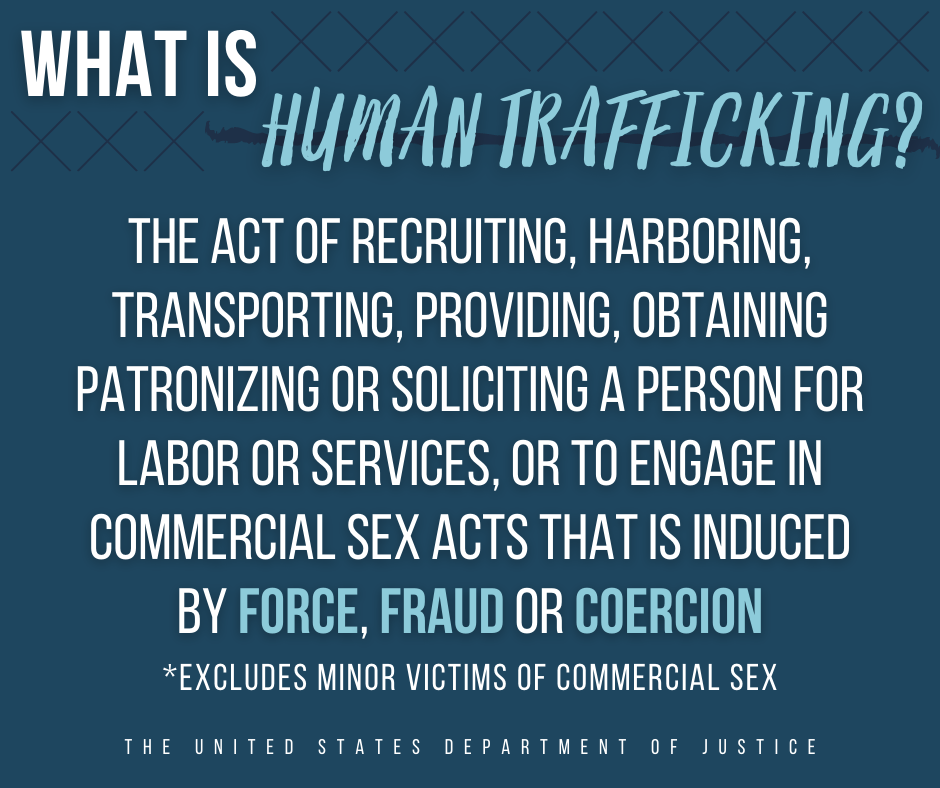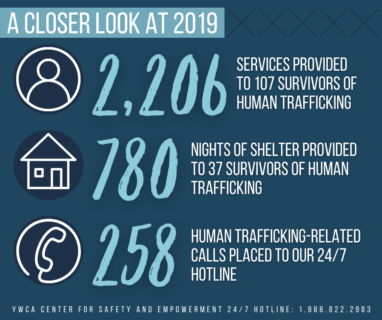On a Mission to Prevent Human Trafficking
To Protect Local Youth, Multiple Agencies Plan Human Trafficking Awareness Campaign

- 470 individuals in Kansas reported being a victim of human trafficking in 2017.
- The COVID-19 pandemic has increased the risk factors for human trafficking among particularly vulnerable populations.
- This campaign will help parents, educators, and students recognize common tricks used to exploit young people and give the public strategies to interrupt the cycle of abuse.
January is National Human Trafficking Prevention Month. YWCA Center for Safety and Empowerment, Kansas Department of Health and Environment, Topeka Shawnee County Anti-Human Trafficking Coalition and STARS (Stop Trafficking and Reject Slavery), are teaming up to raise awareness of human trafficking in Kansas. Each day in January, a new fact or resource will be posted via social media to help Kansans recognize the warning signs of human trafficking, interrupt attempts to groom victims, and aid survivors. Posts can be found on the Facebook pages of YWCA Northeast Kansas or Topeka Shawnee County Anti-Human Trafficking Coalition. KDHE social media accounts will feature select posts.Increased use of the internet for schoolwork, business, and socialization during the COVID-19 pandemic has made human trafficking awareness and prevention all the more important, since perpetrators often use interactive video games and social media platforms popular with youth to seek their victims. Children between the ages of 11 and 16 are a particularly vulnerable population. Flattery, attention, affection, and gifts are often used by a perpetrator to coerce youth into an exploitative relationship. Economic instability is another risk factor for becoming a victim of human trafficking. With more service industry and entry-level jobs in jeopardy due to the COVID-19 pandemic, perpetrators of trafficking can take advantage of the dire economic depression to maintain control over their victims by making it hard for them to leave.While youth are especially vulnerable to human trafficking, people of all socioeconomic backgrounds, races, ages, and genders are at risk. Myths about human trafficking impede our recognition of the abuse happening in our communities. The 2021 Kansas Social Media campaign will provide citizens with accurate information about grooming, demand, and exploitation that can prevent this crime.To inquire about a training or presentation to your agency, business, club, church or social group, please contact Dr. Sharon Sullivan with Topeka Shawnee County Anti-Human Trafficking Coalition at sharon.sullivan@washburn.edu or YWCA Center for Safety and Empowerment at (888) 822-2983.Learn more from Dr. Sharon Sullivan from this KSNT news story aired on January 14th.If you or someone you know is being forced to engage in any activity, call the toll-free National Human Trafficking Resource Center 24/7 Hotline at 1-888-373-7888 or text INFO or HELP to BeFree (233733) to access help and services.
Economic instability is another risk factor for becoming a victim of human trafficking. With more service industry and entry-level jobs in jeopardy due to the COVID-19 pandemic, perpetrators of trafficking can take advantage of the dire economic depression to maintain control over their victims by making it hard for them to leave.While youth are especially vulnerable to human trafficking, people of all socioeconomic backgrounds, races, ages, and genders are at risk. Myths about human trafficking impede our recognition of the abuse happening in our communities. The 2021 Kansas Social Media campaign will provide citizens with accurate information about grooming, demand, and exploitation that can prevent this crime.To inquire about a training or presentation to your agency, business, club, church or social group, please contact Dr. Sharon Sullivan with Topeka Shawnee County Anti-Human Trafficking Coalition at sharon.sullivan@washburn.edu or YWCA Center for Safety and Empowerment at (888) 822-2983.Learn more from Dr. Sharon Sullivan from this KSNT news story aired on January 14th.If you or someone you know is being forced to engage in any activity, call the toll-free National Human Trafficking Resource Center 24/7 Hotline at 1-888-373-7888 or text INFO or HELP to BeFree (233733) to access help and services.
